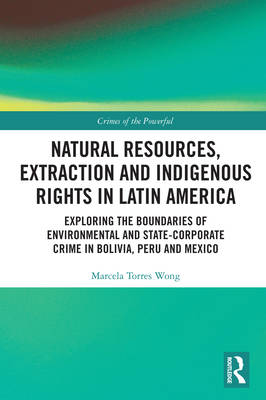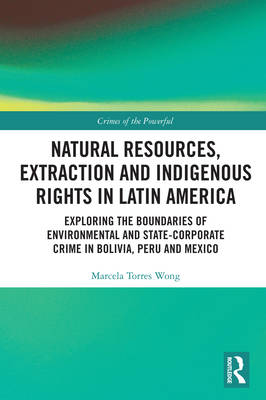
- Retrait gratuit dans votre magasin Club
- 7.000.000 titres dans notre catalogue
- Payer en toute sécurité
- Toujours un magasin près de chez vous
- Retrait gratuit dans votre magasin Club
- 7.000.0000 titres dans notre catalogue
- Payer en toute sécurité
- Toujours un magasin près de chez vous
Natural Resources, Extraction and Indigenous Rights in Latin America
Exploring the Boundaries of Environmental and State-Corporate Crime in Bolivia, Peru, and Mexico
Marcela Torres WongDescription
In 1989, the International Labor Organization stated that all indigenous peoples living in the postcolonial world were entitled to the right to prior consultation, over activities that could potentially impact their territories and traditional livelihoods. However, in many cases the economic importance of industries such as mining and oil condition the way that governments implement the right to prior consultation.
This book explores extractive conflicts between indigenous populations, the government and oil and mining companies in Latin America, namely Mexico, Peru and Bolivia. Building on two years of research and drawing on the state-corporate and environmental crime literatures, this book examines the legal, extralegal, illegal as well as political strategies used by the state and extractive companies to avoid undesired results produced by the legalization of the right to prior consultation. It examines the ways in which prior consultation is utilized by powerful indigenous actors to negotiate economic resources with the state and extractive companies, while also showing the ways in which weaker indigenous groups are incapable of engaging in prior consultations in a meaningful way and are therefore left at the mercy of negative ecological impacts. It demonstrates how social mobilization-not prior consultation-is the most effective strategy in preventing extraction from moving forward within ecologically fragile indigenous territories.
Spécifications
Parties prenantes
- Auteur(s) :
- Editeur:
Contenu
- Nombre de pages :
- 164
- Langue:
- Anglais
- Collection :
Caractéristiques
- EAN:
- 9780367483630
- Date de parution :
- 12-02-21
- Format:
- Livre broché
- Format numérique:
- Trade paperback (VS)
- Dimensions :
- 156 mm x 234 mm
- Poids :
- 258 g

Les avis
Nous publions uniquement les avis qui respectent les conditions requises. Consultez nos conditions pour les avis.






